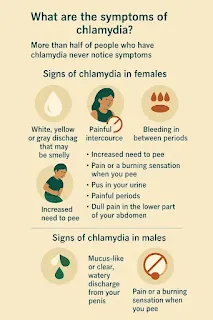Search This Blog
Healthy Horizon360 is a health blog offering well-researched tips on natural remedies, nutrition, and wellness for a healthier lifestyle.
Featured post
Chlamydia: Symptoms, Treatment, Prevention & Latest Research
Chlamydia: Symptoms, Treatment, Prevention & Latest Research
Chlamydia is one of the most common sexually transmitted infections (STIs) globally, affecting millions of individuals each year. Despite being highly treatable, it often goes undiagnosed due to its silent symptoms. This guide explores Chlamydia in-depth, including its symptoms, causes, latest treatments, preventive strategies, and groundbreaking research efforts toward vaccines and new drugs.
What is Chlamydia?
Chlamydia is a bacterial infection caused by Chlamydia trachomatis. It spreads through vaginal, anal, or oral sex. The infection can affect the genitals, rectum, and throat. Women can also transmit Chlamydia to their baby during childbirth, potentially causing pneumonia or eye infections in newborns.
Global Prevalence
According to the World Health Organization, over 129 million new Chlamydia infections are reported globally each year. In the U.S. alone, the CDC recorded over 1.6 million cases in 2023, making it the most commonly reported STI.
Symptoms of Chlamydia
Most people with Chlamydia are asymptomatic. When symptoms do occur, they may differ by sex:
- In Women: Vaginal discharge, painful urination, abdominal pain, painful sex, and bleeding between periods.
- In Men: Penile discharge, burning sensation while urinating, swollen testicles.
- In Rectal Infections: Pain, discharge, bleeding, or inflammation of the rectum.
- In Throat Infections: Sore throat, but often asymptomatic.
Complications of Untreated Chlamydia
- Pelvic Inflammatory Disease (PID): A serious condition in women that can lead to infertility, ectopic pregnancy, and chronic pelvic pain.
- Epididymitis: Inflammation of the epididymis in men, which may cause infertility.
- Reactive Arthritis: Joint pain, eye inflammation, and urethritis, especially in men.
- Increased HIV Risk: Chlamydia can increase susceptibility to HIV infection.
How Chlamydia is Diagnosed
Diagnostic methods include:
- NAATs (Nucleic Acid Amplification Tests): The most accurate test using urine or swabs.
- Self-collection kits: FDA-approved and increasingly available for home use.
Treatment Options
The standard treatment is antibiotics. The CDC currently recommends:
- Doxycycline: 100 mg orally twice a day for 7 days.
- Azithromycin: 1 g orally as a single dose (especially during pregnancy).
Re-testing is advised after three months to confirm clearance of the infection.
Prevention Tips
- Use condoms during all types of sexual activity.
- Get tested regularly if you're sexually active, especially under age 25.
- Limit the number of sexual partners.
- Practice mutual monogamy.
- Avoid douching, which can increase risk in women.
Latest Research and Developments
1. Doxycycline as Preventive (Doxy-PEP)
Recent clinical trials show that taking a 200 mg dose of doxycycline within 72 hours after unprotected sex significantly reduces Chlamydia infections among men who have sex with men (MSM) and transgender women. This is being hailed as a game-changer in STI prevention.
2. Chlamydia Vaccine Under Development
Researchers at the Uniformed Services University (USU) have developed a new vaccine using inactivated whole-cell bacteria with promising results in mice. It not only prevented infection but also reduced long-term tissue damage. Human trials are anticipated within the next two years.
3. New Drugs: Pentamidine for Chlamydia Prevention
Scientists from MedUni Vienna discovered that pentamidine, a compound once used against pneumonia in AIDS patients, could prevent chlamydia infections when used as a prophylactic. In mouse models, it significantly blocked infection when applied topically in small doses.
Testing Recommendations
- Women under 25: Annual screening recommended.
- Pregnant women: Test early during prenatal visits.
- Men who have sex with men: Regular screening for rectal and throat infections.
Partner Notification and Legal Considerations
Many states have laws requiring individuals diagnosed with Chlamydia to inform sexual partners. Expedited Partner Therapy (EPT) allows partners to receive treatment without seeing a doctor, which helps reduce reinfection rates.
Living with Chlamydia
With early detection and treatment, Chlamydia is easily curable and does not cause lasting harm. However, long-term consequences may occur if left untreated. Individuals are advised to abstain from sex until treatment is completed and partners are also treated.
Frequently Asked Questions (FAQs)
Can Chlamydia go away without treatment?
No. Chlamydia requires antibiotic treatment. Left untreated, it can lead to serious complications.
How soon can I have sex after treatment?
Wait at least 7 days after finishing treatment before having sex again.
Can I get Chlamydia again?
Yes, reinfection is common. Regular testing and partner treatment help prevent it.
Is Chlamydia contagious through kissing or sharing toilets?
No, it does not spread through kissing, sharing toilets, or casual contact.
Can Chlamydia affect fertility?
Yes, untreated Chlamydia can cause infertility in both men and women.
Is there a cure for Chlamydia?
Yes, Chlamydia is fully curable with prescribed antibiotics.
Do condoms prevent Chlamydia?
Yes, when used correctly, condoms are highly effective in reducing transmission.
Can I test myself at home?
Yes, FDA-approved at-home testing kits are accurate and widely available.






.webp)
